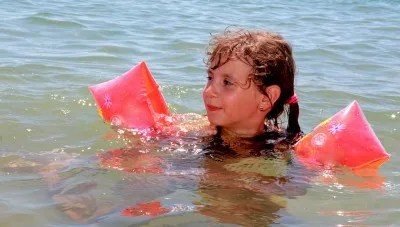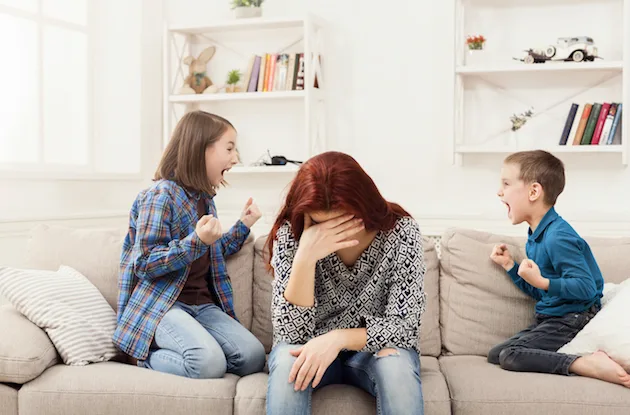Summer is right around the corner, and that means pools, beaches, and water sports galore. But when you spend time near the water with your kids, the number one thought for many parents is water safety. As temperatures begin to heat up and Memorial Day weekend is in sight, it’s time to increase awareness about the importance of learning to swim. SwimWays, a leading manufacturer of pool and outdoor recreational products, is hosting National Learn to Swim Day on Saturday, May 18. In honor of this educational campaign, SwimWays is partnering with Mario Vittone, former Coast Guard Helicopter Rescue Swimmer. Vittone spoke with us about the best ways to keep your kids safe and to prevent drowning when it comes to water safety.

What is the number one thing to keep in mind when it comes to swim safety for kids?
The first thing is supervision. It’s always supervision. Most people focus on avoiding drowning, but that’s not the only thing that can happen. For every drowning, there are at least four injuries where the person doesn’t die but they’re hurt, they get lung problems, or lung infections, or even brain damage. What parents have to understand even before they can supervise is that drowning is quiet. You’re not gonna hear it happen, you have to be watching for it. So you can’t just run inside for a minute…you shouldn’t be texting…there’s no such thing as “just a minute.”
Should parent’s attitudes about swim safety change as a child grows older or is it more about ability and less about age?
The level of supervision necessary doesn’t change based on age, it changes based on swimming abilities. An adult that’s a non-swimmer needs supervision as well. It starts off with infants and toddlers and non-swimmers with touch-supervision: you need to be close enough to touch them, whether that’s in the water or out, that’s as close as you need to get. As they get better then there can be a little more distance in the supervision, you can back off and be outside the pool, you don’t have to be in there with them. You can slide the supervision back — for example with my teenager, I just want to be on the pool deck, or have someone on the pool deck watching him. My 14 year old son can go to a pool party but I need to know that someone is there watching the water while they swim.
No matter how great a swimmer a child or a teenager is, should they ever be allowed to swim unattended, like in a backyard pool, for example?
I don’t swim alone, and I’m the best swimmer I know. It’s one of those things where there’s no gain in it. I don’t swim on unguarded beaches. I used to swim alone a lot as a helicopter rescue swimmer, you jump off and you’re by yourself out there, but that was a paid risk job.
Some kids are better swimmers than others. Can a parent bring a non-swimmer to the pool with friends or siblings who can swim? How can we keep that child safe?
There’s a couple of ways to do that. One of the ways is you can give them protection in the form of a life jacket. And that’s not always cool, a lot of kids don’t like that because they look kind of dorky, but SwimWays makes a product called Sea Squirts Life Jacket that’s really cool. I want one, but they don’t make it in my size! So you can put a life jacket on the child.
Or, you just have to swim with them. There’s no reason you can’t let them have fun; that’s how they’re going to get better. If you say, “My kid’s not a good swimmer therefore I’m never gonna let them get in the water,” then they’re never going be a good swimmer. That play is important, and you can do it safely, either with life jackets or with supervision and helping them get better.
The problem is not all parents swim – half the country doesn’t swim – so that’s where you get into a real problem. In that case, you can both take swim lessons.
What’s an appropriate age for kids to start taking swimming lessons?
There are a lot of philosophies on that, but my opinion is it’s not about the age at which they start, it’s about what those lessons are. The American Association of Pediatrics says after 1 years old and by 4 years old, but there’s a very successful program to start kids really early. It’s the definition of a “lesson” that is the problem. You don’t take them down to the YMCA and teach them how to do freestyle at 7 months old, but you can introduce them to the water at 6 months.
My first lesson was my dad dragging me through the water at 8 weeks old. It wasn’t a formal lesson, it was my dad playing with me in the water and teaching me the water was fun. He didn’t even know he was doing it, he was just hanging out with his kid at the pool.
You’ll see these things on YouTube all the time about instant self-rescue, where the kids will turn on their back and float to the edge of the pool and they call it “drown-proofing.” There’s no such thing as drown-proofing. I don’t agree that children should learn to survive at six months old. Lessons, introduction to the water, learning to swim, you bet. Learning survival? It’s too heavy.
What parents should look out for when teaching kids to swim with swim lessons is you make it primarily about fun and play. If a child’s crying, if you go to watch a swim lesson and the kids aren’t having fun, if there’s any kind of tearful or traumatic event going on, that’s bad.
What are some of the best ways to teach our kids about swim safety without scaring them or making them afraid to swim?
Parents shouldn’t be afraid of the water, because they’ll pass that fear. If parents are afraid of the water, kids will notice that and it will transfer a little bit.
As far as talking them about it, there are a couple of good children’s books, one is Josh the baby Otter, so at a very young age if you’re trying to tell them how to be safe, it’s not about the negative, it’s about the positive — there’s three lessons: always swim with an adult, learn how to float, and always swim with a buddy. Never go near the water without an adult. You’re not trying to teach them about water safety, you’re trying to affect their behavior. That book is a really easy…it does a really good job, if you read it to your kids it gives them some context, you know, “I want to be like that little baby Josh and always be near my mom.” Don’t go near the water without an adult, learn to swim, swimming’s fun, and always swim with a buddy. Those are the quick three must-have lessons you want your kids to know. It’s not about fear or about what could happen that’s bad, just about the good.
If you see a child who looks like they are in trouble in the water, what are the exact steps you should take to help them?
I get asked that question a lot and there are so many different answers. There’s never going to be an exchange for real common sense in this regard. Some people say if you’re not a trained rescuer, you don’t go in, you’ll hear that a lot. I think parents should first apply some common sense.
If you’re watching some moderately good swimming four year old, and they’re in the five foot end and they’re starting to have some problems, and you’re a six foot male, you know, walk over and grab them. Don’t say, “oh, I’m not a trained rescuer, I’m not supposed to go.” Get in there!
If there’s a rule, it’s reach for them first. But you’ll also hear this thing of reach and then throw, that if you can’t reach them, throw something. I’m telling you, the younger the child, the less likely they are to grab something that you throw at them. This is one of those supervision things where if your children are at a level where them getting into the deep end can cause them real problems, then you should still be within touch supervision. You shouldn’t be away from them, or let them get away from you.
Any good pool should have a rescue hook, what we call a shepard’s hook, and that’s the long pole, even if you can hang on the side of the pool and reach your leg out to give them something to grab. Short of becoming a trained rescuer, try common sense, reach for them when you can, and try really hard not to let them get in that situation.
What are some key questions parents should ask when they send their kids somewhere to make sure the situation is as safe as it would be in your own home?
You should ask if they are doing the same things you would do in the situation. Are they behaving the way I would behave? Do you have someone designated to watch the water and do nothing else? Do you have enough supervision to do that? If there’s 30 kids and 1 adult, that’s not enough.
I’ve dropped my kids off at pool parties where there were 35 kids and 1 adult, and when I saw that I realized I wasn’t going to be able to leave. My choices were to say to my kid, “No, you’re not staying at your friend’s birthday party,” or to stay myself, so I stayed.
If there are 30 kids and a big pool, I want probably 5 adults, and a lifeguard, you know? If it’s a public pool with that has one guard that’s there nine hours during the day? Nine hours is too long to watch the pool. If there’s one guard for the entire shift and they’re tasked with other jobs like checking IDs, that’s not okay.
A real municipal pool, with shifts of three lifeguards and three extras in rotation and a supervisor, that’s as safe as you can get. And if your kid’s a non-swimmer, have them wear a lifejacket. My daughter was at camp for a week and I sent her with her own lifejacket so she could have it to wear when she decides to, not when they decide she should.
You have to have people watching like you. If you watch your kids at the pool full time then that’s the first question I have, is there someone to watch the pool full time?
Is there anything else you’d like to tell our readers about water safety?
The pool itself needs to be managed. The water needs to be clear all the way down to the deep-end, it needs to be a well-maintained pool. If your backyard pool is cloudy it’s a non-swimming pool until it gets clear.
Also, water safety is not just about pools. A small child can drown in 2-inches of water; supervision is always necessary.
Looking for a place to enroll your kids in swimming lessons? Check out our directories to find the right place for your child.
Swimming Lessons in Rockland, NY
Swimming Lessons in Westchester, NY
Swimming Lessons in Queens, NY
Swimming Lessons in Fairfield, CT
Swimming Lessons in Nassau, Long Island





















